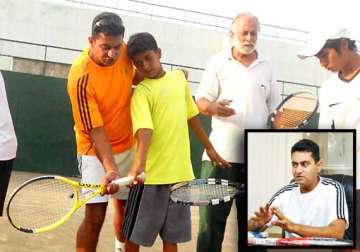Indian Birbal Wadhera Coaches Budding Tennis Players In Pakistan
Islamabad, June 2: Flanked by armed guards and with his itinerary heavily restricted, Birbal Wadhera has worked with dozens of budding young tennis players in Pakistan over the last month with the dual aims of
Islamabad, June 2: Flanked by armed guards and with his itinerary heavily restricted, Birbal Wadhera has worked with dozens of budding young tennis players in Pakistan over the last month with the dual aims of developing talent and showing other foreign sports people that it's safe enough to return.
It didn't help ease the concerns of friends and relatives in India that he arrived barely 48 hours after Osama bin Laden was killed by U.S. Navy SEALs on May 2 in the garrison city of Abbottabad, only 60 km from the capital Islamabad, where the 33-year-old Wadhera held his clinic.
Seven years ago Wadhera conducted a 15-day coaching clinic for the Pakistan Tennis Federation. That visit gave Wadhera enough confidence to return.
"My friends in India and abroad told me ‘avoid going to Pakistan'," Wadhera said. "Then just two days before I came here this Osama thing happened and you can well imagine how many people would have stopped me."
Seven years ago Wadhera conducted a 15-day coaching clinic for the Pakistan Tennis Federation. That visit gave Wadhera enough confidence to accept another invitation, this time for longer, despite ongoing security concerns.
"I believe that sports and politics should not be mixed," he said. "Sports bind and combine people."
Pakistan has attracted foreign sports coaches in the past, most notably for cricket, but Wadhera is in a very small group of expats now working with Pakistani athletes on their home soil. Dutchman Michel van den Heuvel coaches the national field hockey team. Sports exchanges between Pakistan and India are rare.
And Pakistan has become a no go zone for foreign teams over the last two years since gunmen attacked the Sri Lankan cricket team's transport convey enroute to a test match at Lahore. It also led to Pakistan being stripped of its rights to co-host the cricket World Cup this year.
"No country likes to have terrorism whether it's Pakistan, India or any other nation," Wadhera said. "I won't deny there were doubts (about security) in my mind before coming here, but I was confident that I will be safe."
There's no doubt cricket has been worst impacted by terrorism as the Pakistan Cricket Board has been forced to shift its ‘home' bases to the United Arab Emirates and England, but other sports have been affected. Pakistan has been playing its ‘home' Davis Cup tennis ties abroad.
Local authorities hope recent trips by Afghanistan's cricket team and the employment of coaches like Wadhera could be a small step toward restoring the confidence of other countries with traditional sports ties, such as Australia, England, New Zealand and South Africa.
"I want to send a message to the world to ‘come and see yourself,"' Wadhera told The Associated Press in a relaxed interview at the tennis clinic. "It's no use searching about the country (Pakistan) on the internet."
On the courts, Wadhera is like an army officer instructing his recruits at a military academy.
In a commanding, sharp voice, he hones the players on how to serve and volley, constantly shouting instructions as he hits the ball across the net.
"I want you to win the point, there's no other option," he screams in a commanding tone. "You should be more quicker than the ball."
It's not all harsh, however. Wadhera, a former Wimbledon and Australian Open umpire, offers plenty of encouragement to the budding players.
"Come on, come on, shabash shabash (good good)," Wadhera said whenever he found a player returning the ball to his satisfaction.
Wadhera, who is from Chandigarh in northwestern India, coached the Indian national team between 2003-05 before turning his attention more globally, and working as an official at two of the tennis majors.
He returned to coaching full time in 2006. His goal now is to develop a squad of talented young players into a new generation of professionals.
With Pakistan's top players Aisam-ul-Haq and Aqeel Khan already on the international circuit, Wadhera was working with a pool of around 75 players.
The PTF originally planned to send 8-10 junior players abroad for training, but Wadhera's availability helped ensure more players would get the benefit of a professional coach—and save the federation millions of rupees.
"The best thing about Wadhera is his strict discipline," PTF president Kaleem Imam said. "We hope that at least 10-12 juniors will be groomed for future after his training."
The benefits should be broader. The PTF has also sent its three coaches—Inamul Haq, Asim Shafik and Jehanzeb Khan—to work with Wadhera.
Wadhera—accompanied by two armed paramilitary officers—also watched a limited-overs cricket match between a second-string Pakistan and the up-and-coming Afghanistan squad. Needing a security detail isn't ideal, Wadhera concedes, but it's a sign that Pakistan is taking the welfare of its visitors seriously.
"I know its a small step, but at least its a step in right direction," he said.
Wadhera leaves for India next week and said he would not hesitate to come back to Pakistan and train more youngsters in future.
"Of course I would love to come back here, India and Pakistan has so much things in common, the language, the culture—even the people look one and the same," he said.
The only change Wadhera would like to see is that he might be able to, as originally planned, go to other cities such as Karachi and Lahore—without the company of commandos. AP
